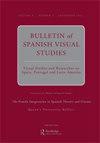Eli Neira: Pursuing Community and Interconnectedness against the Commodification and Institutionalization of Culture in Chile*
Q4 Arts and Humanities
引用次数: 0
Abstract
Abstract Eli Neira (b. 1973) is a Chilean poet, artist, performer and blogger who resists traditional infrastructures of cultural production. The works studied in this article (an open letter to FONDART, ‘Big Money’, ‘Soy Terrorista: Anti Postal 6, al Mapuche en huelga de hambre,’ ‘Inmaculado Corazón’ and ‘Limpieza colectiva como obra de arte’) address the issues of consumerism and art, the environment, and religion and sexuality but they are united by an overarching project which challenges the commodification and institutionalization of culture by seeking out new outlets and audiences. In so doing, Neira seeks to occupy what she terms ‘zonas intersticiales’ (in-between spaces) or a ‘zona peligrosa’ (danger zone). This terminology, however, alerts, us to the inevitable contradictions in her practice as she resists, but is inevitably part of, the cultural field which she critiques. Neira’s work, therefore, is significant because it helps us to understand resistance as relational and not as something that is ‘outside’ or disengaged from that which it resists. Whilst her work alerts us to the limits of resistance, so too does it suggest more inclusive artistic practices which prioritize a sense of interconnectedness and community.Eli Neira:智利文化商品化与制度化:追求共同体与互联性*
Eli Neira(生于1973年)是一位智利诗人、艺术家、表演者和博客作者,他抵制传统的文化生产基础设施。本文研究的作品(致FONDART的一封公开信,《大金钱》,《大豆恐怖分子:反邮政6》,《El Mapuche en huelga de hambre》,《Inmaculado Corazón》和《Limpieza colectiva como obra de arte》)解决了消费主义和艺术、环境、,以及宗教和性,但它们被一个总体项目所团结,该项目通过寻找新的渠道和受众来挑战文化的商品化和制度化。在这样做的过程中,Neira试图占据她所说的“间隙地带”(在空间之间)或“peligrosa地带”(危险地带)。然而,这个术语提醒我们,在她的实践中不可避免的矛盾,因为她抵制,但不可避免地是她所批评的文化领域的一部分。因此,奈拉的工作意义重大,因为它帮助我们将抵抗理解为关系性的,而不是“外部”的或脱离它所抵抗的东西。虽然她的作品提醒我们抵抗的极限,但它也暗示了更具包容性的艺术实践,优先考虑相互联系和社区感。
本文章由计算机程序翻译,如有差异,请以英文原文为准。
求助全文
约1分钟内获得全文
求助全文
来源期刊

Bulletin of Spanish Visual Studies
Arts and Humanities-Visual Arts and Performing Arts
CiteScore
0.20
自引率
0.00%
发文量
15
 求助内容:
求助内容: 应助结果提醒方式:
应助结果提醒方式:


